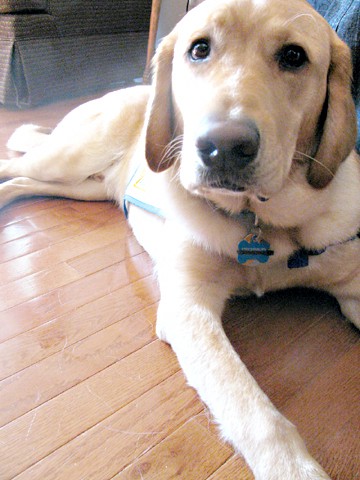H-E-L-P is a Four-Legged Word
“I’ve had an engine fail on my plane,” says Nancy Patterson, of Davidsonville, a retired airline pilot. “I’ve had brain surgery. But this has been the most life-changing thing I’ve ever gone through.”
Patterson is talking about her experience with Mahler, her service dog from Canine Companions.
“Help is a four-legged word,” according to Canine Companions for Independence. As the largest non-profit providing service dogs to people with most types of disabilities, Canine Companions makes good use of the natural knack for helping common to Labrador and golden retrievers.
Patterson and Mahler came together in November 2007, after both went through rigorous training to make sure the match was made in doggy heaven.
Mahler, an 80-pound golden retriever-Lab mix, underwent 16 months of basic training with a puppy raiser, then six months of training at the Metro Long Island training center where Patterson went to complete her intense two-week training session.
Then came matchmaking, which is a little like interspecies speed dating. For the first three days, dogs and humans meet with Canine Companions watching to see how the pairs interact.
“On the third day, the dog they expect to match you with is the dog you’ll work with,” Patterson says.
Mahler was the right dog for her, Patterson says, making him worth her longer-than-usual two-and-a-half-year wait.
The big, gentle dog has given her the freedom and the ability to participate in the world as much as she likes.
“He teaches me, and I teach him,” she says. He’s helped her be more social, and she’s taught him 50 commands, doubling his original vocabulary.
Patterson says she has had “disabled mobility,” since 1984. Brain surgery followed in 2004. Using a manual wheelchair helps her keep up her strength, which is limited.
“Mahler knows to be gentle and knows how I need help, like with opening doors, extending up to reach things and pulling the chair when I’ve had to park far away from buildings,” Patterson says. “Having him gives me more hours in the day I can be useful.”
As well as physical mobility, Mahler gives his partner newfound social mobility.
“Instead of people being afraid because of my disability and wheelchair, now people are comfortable, smile at me, and want to come over and ask to pet Mahler,” Patterson says. “So he’s allowed me to meet a lot of new people and experience a lot of things I would have had to give up on without him.”
“When I went to the first demo, the instructor had a dog pick up a dime and I never forgot that,” Patterson says. “Now Mahler picks up my dimes.”
Completing the helping circle of Canine Companions for Independence, Patterson uses Mahler to help her help others.
“It doesn’t end with me. Now because of Mahler, I’ve helped a lot of other people,” says Patterson, who is volunteer coordinator for Canine Companions for Independence, as well as a very active member of Anne Arundel County’s Commission on Disability Issues. “Getting a dog like this opens the world to people.”
Raising Mahlers
 Service dogs like Hopper spend 15 to 16 months with volunteer puppy raisers like Debra Strickenburg learning commands and skills.
|
That’s the kind of reward that resonates with puppy raisers Mark and Debra Strickenburg, of Crofton. They’ve taken on the responsibility of raising, training and loving three eight-week-old service pups. Hopper, a golden retriever and Lab mix, is their latest puppy.
With the kids first at college, then married, the Strickenburgs decided to raise more children to send off into the world. This time the kids had fur and two extra legs.
“As volunteer puppy raisers, we teach basic commands like sit, stay, heel,” Debra says. “But since the goal is for the dogs to be invisible and not afraid in public, we take Hopper to restaurants and practice going to the bathroom on command on all surfaces in preparation for being a service dog.”
After 15 to 16 months with puppy raisers like Strickenburg, the service dogs in training are on their way to being full-fledged helpers. Only 40 percent of the dogs complete the program; the other 60 percent “choose another career,” like sniffing for bombs or being a civilian companion, Debra says.
“We know that when we fall in love with our dog and then give them back they will be taken care of because of the dedication Canine Companions puts into the safety and well-being of the dogs,” she says.
It’s like letting go of your kids, the Strickenburgs agree.
Like graduations and weddings, ceremony marks the transition.
“The leash hand-off ceremony — where the puppy raisers give the leash of the dog they raised to the person the dog will be helping — adds to the feel of connectedness, since we get to see who will have the dog,” Mark says. “It gives us a sense of closure.”
Needed: You
Each of the four types of Canine Companions for Independence — service dogs, skilled companions, hearing dogs and facility dogs — cost $45,000 to $50,000. With lots of people waiting for dogs, which come to their human companions at no charge, you can help keep the circle turning.
The Sails and Tails Annual Benefit for Canine Companions for Independence helps rectify the imbalance. Organized by the Strickenburgs for the third year, the fundraiser showcases pups in training as well as full-fledged service dogs. Auctions, the prospect of winning donated prizes from local businesses and a wine and chocolate tasting add to the appeal.
To that, Patterson adds her own appeal. “Mahler is like my arm and my leg and my heart,” she says. “I can’t imagine not having him now. He is a part of me.”
